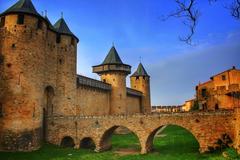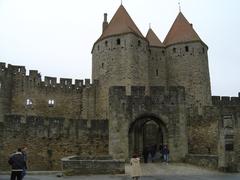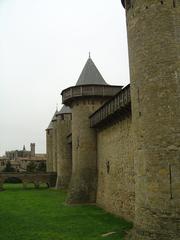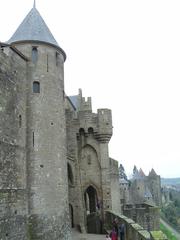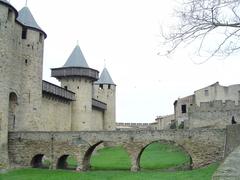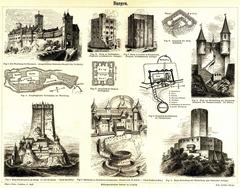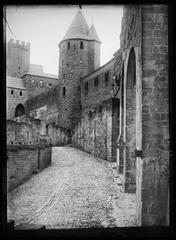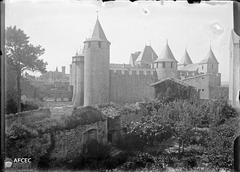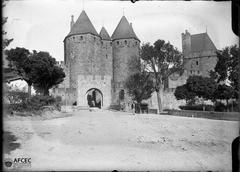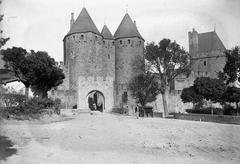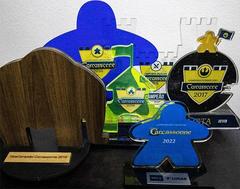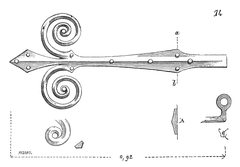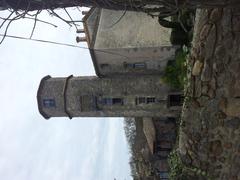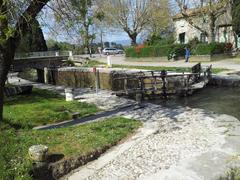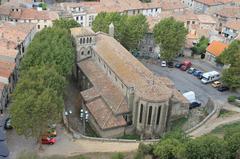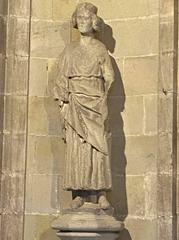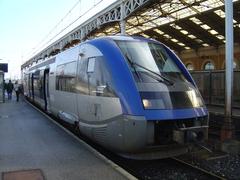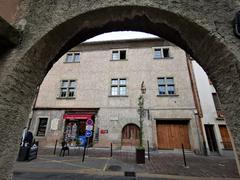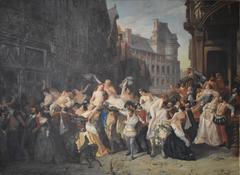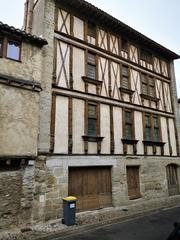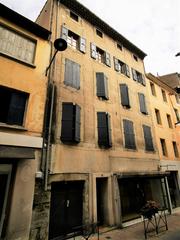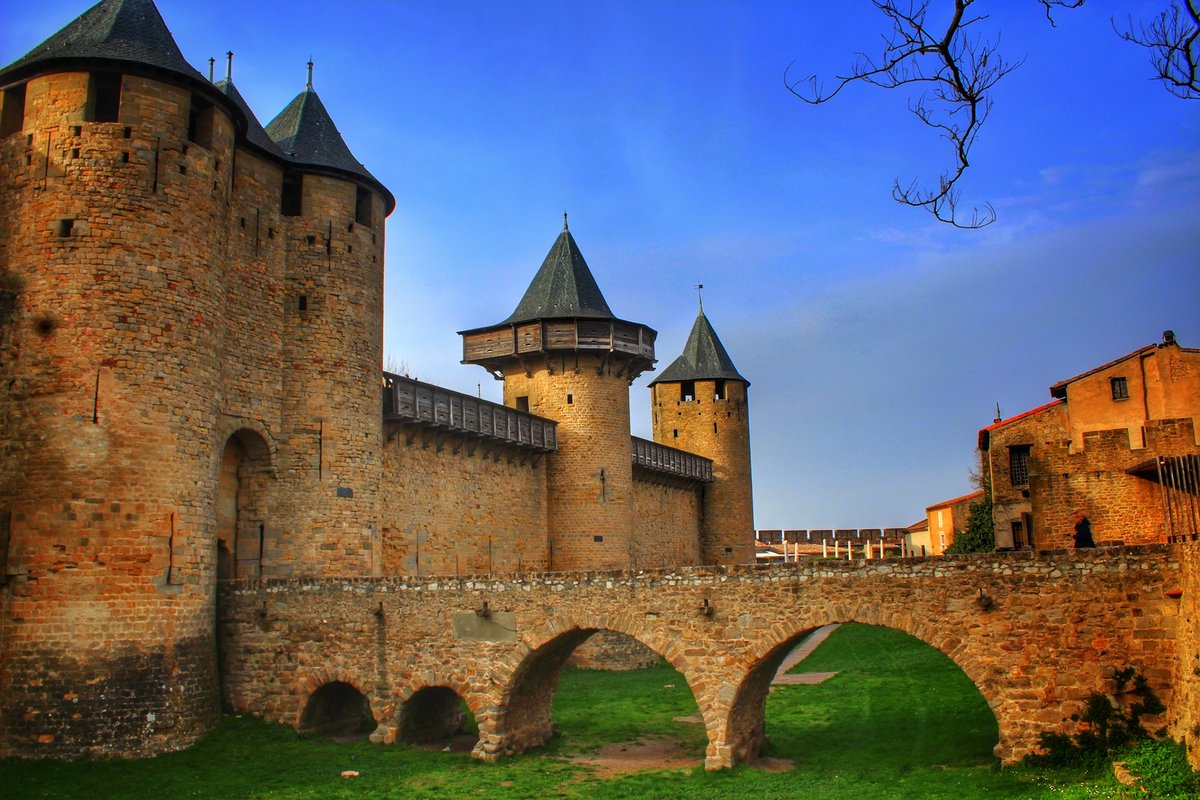
Château Comtal de Carcassonne: Visiting Hours, Tickets, and Travel Guide
Date: 14/06/2025
Introduction
The Château Comtal de Carcassonne, nestled within the UNESCO-listed Cité de Carcassonne, stands as a formidable symbol of medieval architecture, military strategy, and the enduring spirit of southern France. Constructed in the 12th century and intimately tied to the region’s tumultuous history—including the Trencavel dynasty and the Albigensian Crusade—this restored fortress invites visitors on a journey through centuries of conflict, culture, and craftsmanship. Today, the Château Comtal is not only a monument to the past but also a vibrant heritage site, welcoming visitors from around the world to explore its ramparts, towers, and museum exhibits that illuminate the story of Carcassonne (remparts-carcassonne.fr; whc.unesco.org; grand-carcassonne-tourisme.co.uk).
This guide covers everything you need to plan your visit—from historical context and architectural highlights to practical information on tickets, opening hours, accessibility, and travel tips.
Table of Contents
- Historical Overview
- Architectural Features and Evolution
- Visitor Information
- Travel Tips
- Nearby Attractions
- Cultural Significance
- Family & Group Experience
- Practical Tips
- Visitor Facilities
- FAQs
- Visuals & Media Suggestions
- Internal and External Links
- Conclusion & Call to Action
- References
Historical Overview
Origins and Early History
Carcassonne’s strategic prominence dates back to the pre-Roman era, with evidence of settlements as early as 800 BCE. The Romans fortified Carcaso after 122 BCE, establishing it as a trading hub and constructing the first defensive walls—some remnants still visible today (remparts-carcassonne.fr; whc.unesco.org). The site withstood successive invasions by the Visigoths, Umayyads, and Franks, each contributing to the city’s evolving defenses.
The Trencavel Dynasty and Medieval Construction
In the late 11th century, the Trencavel family emerged as lords of Carcassonne. Bernard Aton IV, a notable figure, initiated the construction of the Basilica of Saint-Nazaire and the palatium, which became the nucleus of the Château Comtal (remparts-carcassonne.fr). The Trencavels’ support for Catharism led to their downfall during the Albigensian Crusade.
Albigensian Crusade and Royal Takeover
In 1209, the crusaders besieged Carcassonne, forcing the Trencavels to surrender. The castle and city became a royal fortress, its defenses expanded and modernized to strengthen the French southern border (catharcastles.info; laramoneta.com).
Decline and Restoration
Following the Treaty of the Pyrenees in 1659, Carcassonne’s strategic importance waned. By the 19th century, the castle was neglected until architect Eugène Viollet-le-Duc undertook a major restoration, returning the site to its medieval splendor (en.wikipedia.org; whc.unesco.org).
UNESCO World Heritage Status
In 1997, the Château Comtal and the entire Cité de Carcassonne were inscribed as a UNESCO World Heritage Site for their outstanding medieval architecture and preservation (whc.unesco.org).
Architectural Features and Evolution
Medieval Military Design
The castle exemplifies medieval military architecture, boasting thick stone walls, a central keep, towers, arrow slits, machicolations, and a moat. Its elevated position provides commanding views over the Aude River and surrounding lands, essential for both defense and surveillance (europescastles.com).
Double Enclosure and Ramparts
Château Comtal is integrated into Carcassonne’s famous double rampart system, featuring 52 towers and nearly 3 km of defensive walls (sacavoyage.fr). The castle’s own moat and barbicans create a “fortress within a fortress,” illustrating the sophistication of medieval fortification.
Romanesque and Gothic Influences
Built in the Romanesque style and later enhanced with Gothic elements, the Château Comtal’s architecture reflects the changing tastes and needs of its occupants. Visitors can admire rounded arches, ribbed vaults, and intricate stonework (cultureactivities.com).
Restoration by Viollet-le-Duc
The 19th-century restoration by Eugène Viollet-le-Duc introduced slate roofs and reimagined elements based on historical research, ensuring the castle’s preservation and contributing to its current iconic appearance (grand-carcassonne-tourisme.co.uk).
Interior and Museum
Inside, the castle houses a museum displaying medieval weaponry, artifacts, models (including a detailed scale model of the citadel), and sculptures from antiquity to the Middle Ages. The exhibit layout offers insight into the daily life and military history of Carcassonne (grand-carcassonne-tourisme.co.uk).
Panoramic Views
The ramparts and towers provide sweeping vistas of the medieval city, the Languedoc vineyards, and the distant Pyrenees—perfect for photography enthusiasts (francerent.com).
Visitor Information
Opening Hours
- April to September: 9:30 AM – 7:00 PM (last admission 45 minutes before closing)
- October to March: 10:00 AM – 5:00 PM
- Closed: January 1, May 1, December 25
- Hours may vary during holidays and special events; consult the official website for updates.
Tickets and Pricing
- Adult: €13 (as of June–September 2025)
- Youth (7–17): Discounted rates; children under 7 free
- Students, seniors, and other discounts available
- Free entry: First Sunday of each month, November to March
- Guided tours: €20.50–€27 (adults), €6 (youth 7–17)
- Audio guides: Available in multiple languages
Purchase tickets online to secure your preferred time slot and avoid queues.
Accessibility
- Wheelchair access to key areas; adapted routes and assistance devices available
- Free admission for visitors with disabilities and their accompanying person (with documentation)
- Contact ahead (+33 4 68 11 70 70) for arrangements
- Some areas (especially ramparts) are not suitable for strollers or those with mobility issues
Visitor Services
- Multilingual staff and guides (English, Spanish, Italian, French Sign Language)
- Restrooms and gift shop on-site
- No cloakroom; security bag checks in place
Travel Tips
- Best times to visit: Early morning or late afternoon for fewer crowds and optimal lighting
- Tickets: Book in advance, especially in summer
- Footwear: Wear comfortable shoes for cobblestones and stairs
- Weather: Hot in summer—bring water, sun protection, hat; winter can be chilly and slippery
Nearby Attractions
- Basilique Saint-Nazaire: Stunning Romanesque-Gothic church with stained glass windows
- Medieval Ramparts: Walk the double walls for panoramic views
- Medieval Streets: Explore shops, cafés, and artisan boutiques within the Cité
- Other historical sites: Visit local museums and enjoy the lively city center
Cultural Significance
Living Heritage and Local Identity
The Château Comtal is a symbol of Carcassonne’s identity and resilience, immortalized by the legend of Lady Carcas, who, according to tradition, saved the city by outwitting Charlemagne’s siege (Travel France Bucket List). Statues and local lore celebrate her legacy throughout the Cité.
UNESCO World Heritage
The site’s inscription as a World Heritage Site recognizes its global cultural value and ongoing preservation efforts (whc.unesco.org).
Events and Community Role
The castle is at the heart of Carcassonne’s cultural life, hosting concerts, medieval reenactments, and seasonal festivals. Tourism supports local businesses and artisans (francerent.com).
Family & Group Experience
- Free entry for children under 7; discounted youth tickets
- Supervise children on ramparts and towers for safety
- Families can enjoy interactive exhibits and special events
- Group discounts available; contact the castle for arrangements
Practical Tips
- Allocate at least 1.5–2 hours for the castle and ramparts; half a day for the full Cité
- Restrooms and a gift shop are available on-site
- Food and drink: Many options within the Cité; picnics not allowed inside the castle
- For a unique experience, consider the Petit Train or carriage rides around the walls (Travel for Kids)
Visitor Facilities
- Restrooms and accessible routes in most areas
- Gift shop with books, souvenirs, and regional products
- Numerous restaurants, cafés, and snack bars within the Cité
- Secure your belongings; security measures in place
FAQs
Q: What are the opening hours of Château Comtal?
A: April–September: 9:30 AM–7:00 PM; October–March: 10:00 AM–5:00 PM. Last entry 45 minutes before closing. Closed January 1, May 1, December 25.
Q: How much are tickets and can I buy them online?
A: Adult €13, youth discounts, under 7 free. Book online at billets-carcassonne.fr.
Q: Is the castle accessible for people with disabilities?
A: Yes, with adapted routes and assistance available. Some areas have stairs and are less accessible.
Q: Are guided tours available?
A: Yes, in multiple languages, with options for audio guides.
Q: Can I bring my pet?
A: Only service animals permitted.
Q: Can I re-enter with the same ticket?
A: Yes, same-day re-entry is allowed.
Visuals & Media Suggestions
- Add high-resolution images of the castle exterior, ramparts, towers, and museum exhibits (alt tags: “Château Comtal de Carcassonne exterior view,” “Panoramic view from ramparts”)
- Include a map of the Cité highlighting the castle
- Embed virtual tours if available
Internal and External Links
- Internal: Related guides on the Basilica of Saint-Nazaire, Medieval Sites in Southern France, and Family Travel Tips for Carcassonne
- External: Official Château Comtal website, UNESCO World Heritage listing, Grand Carcassonne Tourisme, Tickets and Visit Planning, France Rent Visitor Guide
Conclusion & Call to Action
The Château Comtal de Carcassonne offers an immersive journey through the heart of medieval France. With its meticulously preserved walls, engaging exhibits, and sweeping views, it is a must-visit for anyone passionate about history, architecture, or culture. Plan your visit by checking current opening hours, securing your tickets in advance, and exploring the Cité’s many treasures.
Enhance your experience with the Audiala app for interactive tours, insider tips, and real-time updates. Stay connected through our related articles and social media for the latest news and special offers. Embrace the magic of Carcassonne—your medieval adventure begins here!
References
- Château Comtal de Carcassonne: Visiting Hours, Tickets, and Historical Insights, 2025, Centre des monuments nationaux
- UNESCO World Heritage List: Cité de Carcassonne, 1997
- Château Comtal Architectural and Visitor Information, 2025, Grand Carcassonne Tourisme
- Château Comtal Tickets and Visit Planning, 2025, Billets Carcassonne
- Visitor Guide and Travel Tips for Château Comtal, 2025, France Rent
- Travel for Kids: Tips for Visiting Carcassonne with Kids & Families
- Travel France Bucket List: Cité de Carcassonne, France
- Budget Your Trip: Château Comtal Worth Visiting
- How Beautiful Life Is: Day Trip to Carcassonne Medieval Citadel and Castle, France
- europescastles.com: Château Comtal
- sacavoyage.fr: Visiting Carcassonne Circuit
- cultureactivities.com: Carcassonne Attractions
